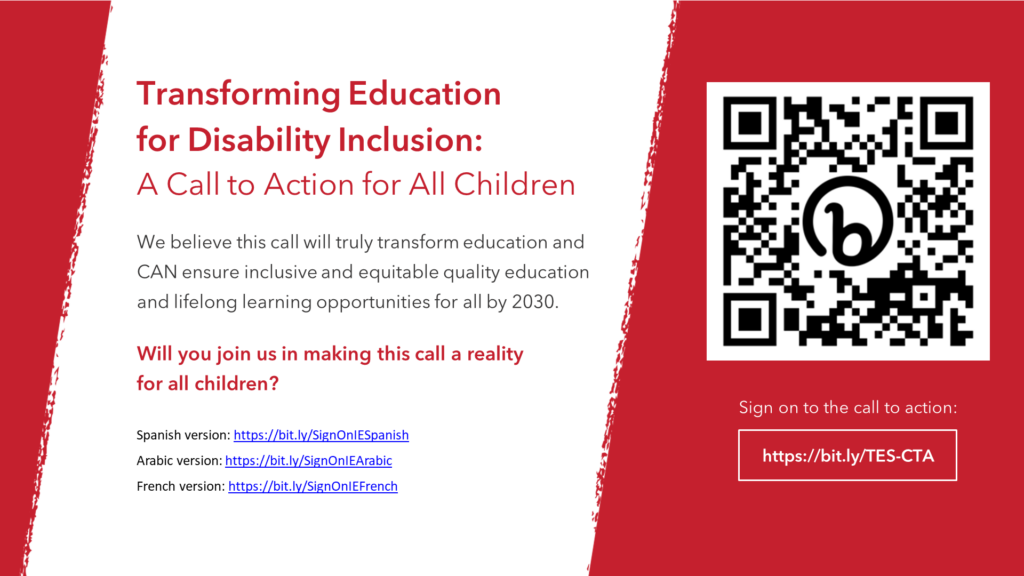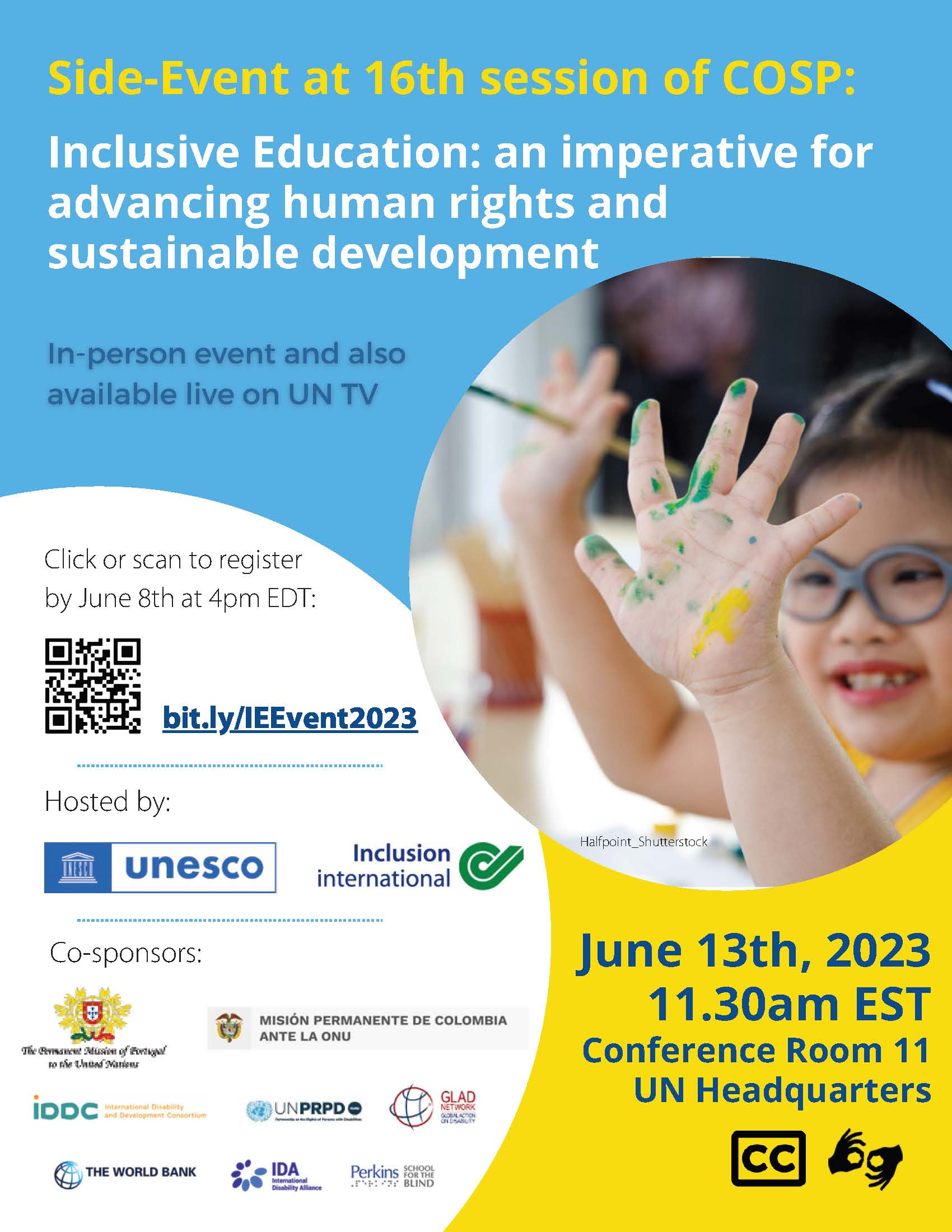Inclusive Education: an imperative for advancing human rights and sustainable development
New-York, 13 June 2023. UNESCO and Inclusion International, together with the Permanent Missions of Portugal and Colombia to the United Nations, co-organised a side event entitled “Inclusive Education: an imperative for advancing human rights and sustainable development” at the margins of the Conference of State Parties (CoSP) to the United Nations Convention on the Rights of Persons with Disabilities (UN-CRPD). The event was co-sponsored by the IDDC Inclusive Education Task Group.
This side followed-up on the UN Transforming Education Summit, which was convened by the UN Secretary-General in response to the global crisis in education – one of equity and inclusion, quality and relevance. 87% of the National Commitments to Transform Education expressed during the Summit recognized “the importance of ensuring more inclusive education systems to cater for the needs of the most vulnerable learners and communities”. There is an urgent need to accelerate efforts and action to ensure that persons with physical, emotional, developmental and intellectual disabilities are not left behind.
Despite the many actions that have been taken, learners with disabilities are among those at highest risk of being excluded from school, or to be taught in segregated settings. Worldwide, laws emphasize segregation in 25% of countries, partial segregation in 48%, integration in 10% and inclusion in 17%. Also, the existence of inclusive policies in some countries does not guarantee proper and effective implementation. When learners with disabilities are included in general schools, they are most likely not receiving the support that they need to learn and participate on an equal basis with their peers with and without disabilities.
The side-event was introduced by Estelle Zadra, Liaison Officer at the UNESCO office in New York and H.E. Ms. Ana Sofia Antunes, Secretary of State for Inclusion, Portugal. It brought together a panel of experts to discuss the challenges still faced by learners with disabilities, share the lived experiences of persons with intellectual disabilities who have gone through inclusive education and exchange on practices and strategies to ensure equitable and inclusive education for all children.
Stephanie Gotlib and Danny Dickson shared the story of their son and brother Adam and his experience in the Australian education system. Adam has autism and intellectual disabilities. His educational journey started in a mainstream pre-school, where he thrived. Challenges arose at the end of pre-school when Adam was transferred to a segregated education setting. There Adam was bored and unhappy: the segregated education setting had only very low and basic expectations for Adam and taught things and skills already known since pre-school. His family decided to push for Adam to go to the same school as his siblings, an inclusive school. There he followed the same curriculum, learned how to read, count and gained social skills with peers. This lived experience demonstrated the need to end segregated education and instead give all children the same opportunities to learn. All families of children with disabilities must be given information about rights, evidence and the chance to enjoy the experience of inclusive schools. Inclusive education is a human right.
Daniela Gissara, expert educator and Assistant Director of International Partnerships at Perkins School for the Blind, shared that parents and teachers need to work together to push for all children to be able to access learning. She also underlined that very often teachers lack training to know how to work with children with disabilities and adapt teaching practices to be more inclusive. Teachers need training, coaching and mentoring. When teachers get the support they need, they can unlock learning and make all children benefit from an inclusive education that teaches the school curriculum but also values such as diversity and equity. Governments should invest on working models that can be scaled up, including building accessible and inclusive schools, training and mentoring teachers on inclusive practices and pedagogies, and engaging parents in education systems.
Ruchi Kulbir Singh, Disability Inclusion Specialist at the Social Sustainability and Inclusion Global Practice at the World Bank, addressed the wider question of enhancing stakeholder capacity and service delivery at the country level, not only from an educational lens but also from a social inclusion system perspective. Building on her over 12 years of experience leading and supporting teams across South Asia and Sub-Saharan Africa in disability-inclusive development, she reflected that although many studies and projects look at mainstreaming inclusion since 2011, there is very little research on the effectiveness and impact of the approach and on how governments implement inclusive education in classrooms. There is even less research on the multi-dimensional determinants of disability inclusive education. Indeed, in practice, many social factors and non-school barriers persist throughout the schooling year and influence school access and attendance. To name a few: the socio-economic status of the children and their family, the perceived value of education for children with disabilities, stigma, and the availability of assistive devices, community transport, or even out-of-pocket expenditures. Ruchi highlighted the importance of ensuring inclusive education implementation and capacity building are undertaken in a contextually relevant and appropriate manner. Key elements for implementing inclusive education include documenting the barriers and enablers at the local level and finding sustainable ways to finance and incentivizing locally-led innovative approaches. There is a need for a stronger partnership between the education and the disability sectors. Disability inclusion is not only the responsibility of disability-focused organisations, it should be mainstream throughout the whole education system.
Diane Richler, former President of Inclusion International and former chair of the International Disability Alliance, chairs the Expert Advisory Group of Inclusion International’s Catalyst for Inclusive Education and coordinates the International Public Policy program of the Joseph P. Kennedy, Jr. Foundation. Reflecting on the initiatives that can support multi-partnerships collaboration on inclusive education, Diane confided that there is still a long way to go. Although some commitments made by governments at the Transforming Education Summit (TES), which took place in September 2023, mention inclusion, in practice national education plans often do not embrace the fundamental changes needed to make educational systems truly inclusive. Diane recalled that the TES pre-summit did not even mention disability in its programme, illustrating how disability inclusion is not currently seen as a priority for education transformation. However, SDG4 will not be met until all children, including children with disabilities, can access inclusive education. She called on governments and participants to endorse the Call to Action on Inclusive Education, which has the support of 200 individuals and oganisations.
The side-event was closed by Arlene B. Tickner, Colombia’s Permanent Representative of the Permanent Mission to the UN.
IDDC is proud to have launched the Call to Action on Inclusive education with partners IDA and GCE and call on all our members to support it. We call on governments to deliver on their promise to leave no one behind by investing in inclusive education systems that are accessible to all children with disabilities.
Transforming Education for Disability Inclusion: A Call to Action for All Children
Launched in September 2022, by the International Disability Alliance, International Disability and Development Consortium, and the Global Campaign for Education, “Transforming Education for Disability Inclusion: A Call to Action for All Children” urges all actors to recognise the power of inclusive education to transform education and to show the 240 million children with disabilities that they matter by committing, by 2030, to:
- Progressively increase budgetary allocations for disability-inclusive education towards being at least 5% of education budgets.
- Set a medium to long-term target to ensure all learners with disabilities are reached in all education programmes, recognising that at least 10% of learners in any country will be learners with disabilities.
- Ensure all education programmes and grants mainstream disability and include disability-inclusion criteria and targets.
More information about the call to action
To sign on to the Disability Inclusive Education Call to Action please see this link: https://bit.ly/SignOnIE – More languages available:
- Spanish version: https://bit.ly/SignOnIESpanish
- Arabic version: https://bit.ly/SignOnIEArabic
- French version: https://bit.ly/SignOnIEFrench

To go further
- GLAD
- IDA
- Inclusion International:
- Listen Include Respect Guidelines for inclusive participation of persons with intellectual disabilities: https://www.listenincluderespect.com/
- Unesco
- Inclusion and Education: All means all, Global Education Monitoring Report, UNESCO, 2020 – French, Spanish, Arabic
- A guide for ensuring inclusion and equity in education, UNESCO 2017 – French, Spanish
- Cali commitment to equity and inclusion un education, UNESCO 2019 – French – Spanish
- World Bank:
- Inclusive Education Initiative Website and Knowledge Hub: www.inclusive-education-initiative.org
- Inclusive Education Community of Practice- Join here- http://bit.ly/Linkedin_IEI
- Inclusive Education Newsletter- Subscribe here
- Pivoting to Inclusion– Leveraging Lessons from COVID-19 Crisis for Learners with Disabilities
- Understanding Multi-dimensional Determinants of Disability-Inclusive Education.
- Perkins: “Include Me” is an open source publication for families, caregivers, community workers, educators, and friends who support and encourage children with disabilities to participate in home, community and educational activities – https://icevi.org/include-me/mdvi/

